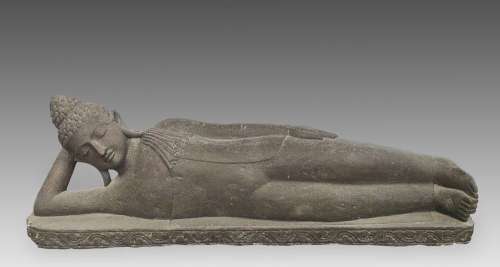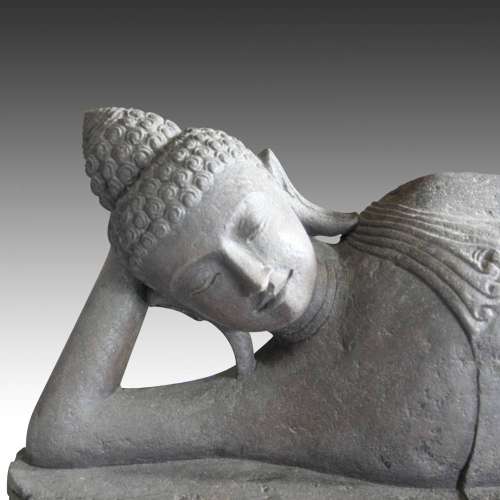Reclining Buddha
The DNA of stone
 |
|
|
Reclining Figure of Buddha Entering Nirvana; Indonesia; Lava Stone; 60 W x 10 D x 20.5 H inches; I.D. #A0910-184; $11,950 |
In the year 824 AD an elderly stone carver labored faithfully in a clearing deep inside the Javanese jungle. He had been working on the same project for over seventy five years; the only artist who had been there since the beginning. An acknowledged master, it was his duty to make one last inspection of the colossal structure upon which he stood. His colleagues bowed their heads as he ran his fingers over numerous statues and relief panels, all depicting the life of Buddha. Proceeding methodically, he remembered Buddha's last words before entering Nirvana: "work diligently." At dusk his task was finally done. A lifetime’s labor concluded with minimal fanfare. Eventually, the artist's name was forgotten. The site was abandoned and his work hidden by volcanic ash and jungle. Yet, all was not lost. Almost a thousand years later his legacy lived on when it was uncovered in statues like this week’s New Arrival.
 |
|
|
Detail of Buddha Entering Nirvana is commonly called a Reclining Buddha; I.D. A0910-184 |
|
This week’s New Arrival features a statue of Buddha entering Nirvana, commonly called a reclining Buddha. Composed of lava stone and measuring five feet in length, it is composed of the same stone found at Borobudur in Central Java - one of the world’s great Buddhist monuments. It’s impossible to determine who carved this piece. Like most Buddhist statuary, there is no signature. Yet, it is certain they were influenced by the style of carving found at Borobudur, which was built in the 9th century AD and subsequently buried in the jungle until its discovery in 1814. Despite the disappearance of this monument for centuries, its artistic legacy never waned. An examination of this Buddha suggests it shares the same lineage as the carver who brought it to life; and both, the same DNA as their ancestors.